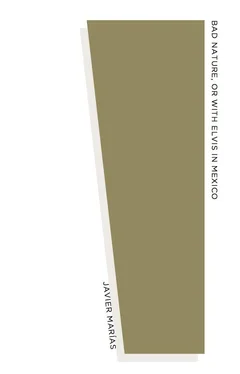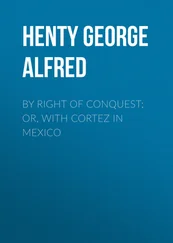Javier Marias - Bad Nature, or With Elvis in Mexico
Здесь есть возможность читать онлайн «Javier Marias - Bad Nature, or With Elvis in Mexico» весь текст электронной книги совершенно бесплатно (целиком полную версию без сокращений). В некоторых случаях можно слушать аудио, скачать через торрент в формате fb2 и присутствует краткое содержание. Год выпуска: 2010, Издательство: New Directions, Жанр: Современная проза, на английском языке. Описание произведения, (предисловие) а так же отзывы посетителей доступны на портале библиотеки ЛибКат.
- Название:Bad Nature, or With Elvis in Mexico
- Автор:
- Издательство:New Directions
- Жанр:
- Год:2010
- ISBN:нет данных
- Рейтинг книги:5 / 5. Голосов: 1
-
Избранное:Добавить в избранное
- Отзывы:
-
Ваша оценка:
- 100
- 1
- 2
- 3
- 4
- 5
Bad Nature, or With Elvis in Mexico: краткое содержание, описание и аннотация
Предлагаем к чтению аннотацию, описание, краткое содержание или предисловие (зависит от того, что написал сам автор книги «Bad Nature, or With Elvis in Mexico»). Если вы не нашли необходимую информацию о книге — напишите в комментариях, мы постараемся отыскать её.
Bad Nature, or With Elvis in Mexico — читать онлайн бесплатно полную книгу (весь текст) целиком
Ниже представлен текст книги, разбитый по страницам. Система сохранения места последней прочитанной страницы, позволяет с удобством читать онлайн бесплатно книгу «Bad Nature, or With Elvis in Mexico», без необходимости каждый раз заново искать на чём Вы остановились. Поставьте закладку, и сможете в любой момент перейти на страницу, на которой закончили чтение.
Интервал:
Закладка:
And I did say that to Ricardo César, I said it in Spanish (stammering a little): “Usted es un matón y un cerdo, y la única maricona gorda es su amiguita del pañuelo.” As soon as I said “maricona gorda,” translating my own words, “fat faggot,” into Spanish, I realized it was the first time those exact words had been spoken there, really, though they weren’t much more offensive than “bailona” or “nena vieja.”
Presley went on: “Tell him this, too: We’re leaving now because we want to and because this place stinks, and I hope someone sets fire to it soon, with all of you inside. Say that, Roy.”
And I repeated in Spanish (but in a less wounding tone and a softer voice): “Ahora nos vamos porque queremos y porque este lugar apesta, y espero que se lo quemen pronto con todos ustedes dentro.”
I saw how Gilbert Ricardo’s biceps were quivering like jelly and a corner of his moustache twitched, I saw fat Julio open his mouth like a fish in feigned horror and run his fingers across his rings as if they were weapons, I saw that one of the two thugs at the table openly pulled back the front of his jacket to exhibit the butt of a pistol in its holster, like an old print of one of Pancho Villa’s men. But Ricardo Romero stretched out his hand to the horizon again, as if he were indicating “five,” which was not at all comforting because there were five of us. Then, with the same hand, he briefly signaled to me with the index finger pointing upward, as if he were holding a pistol and his thumb were the raised safety. Sherry was at the door by then, along with McGraw whose hand was clutching his damaged loin, Hank was pulling at Presley with one hand and kept the other in his pocket, as if he were gripping something. I already said that no one was pulling at me.
Presley turned around when he saw I had translated everything, and in two shakes he was there with the others at the door, and the meaning of the way Hank had his hand in his jacket was unmistakable, to the Mexicans, too. I followed them, the door was already open — I was the straggler, all of them were walking outside, quickening their step, they were already out — I was about to go after them, but the rubber man shoved in between Presley and me, his back in front of my face, he was taller and blocked the others from sight for a second, then the rubber man went out with them, and the bouncer who’d been standing at the door keeping an eye on the street came in and closed it before I could get through. He stood in my way and kept me from passing.
“Tú, gachupín, te quedas.”
I had never believed it was really true that we Spaniards are known as gachupines in Mexico, just as I never believed the other thing they told us when we were kids, that if you were ever in Mexico and ordered “una copita de ojén”—an anisette — to the rhythm of seven thumps on the bar of a cantina — or even if you thumped rhythmically seven times and didn’t say a thing — they’d open fire on you without further ado because it was an insult. It didn’t occur to me to try and verify this just then, I didn’t much feel like having an anisette, or anything else.
This time it wasn’t Gilbert Montalbán who called me gachupín but Julio, and he was looking more irate and uncontrolled to me, I’d watched him knotting up.
“Pero mis amigos ya se marchan,” I said, turning around, “I have to go with them. No hablan español, you saw.”
“Don’t worry about that. Pacheco will go with them back to the hotel, they’ll arrive safe and sound. But they’ll never come back here, eso es seguro.”
“They’ll come back for me if you don’t let me leave,” I answered, trying to glance furtively back at the door, which did not open.
“No, they won’t be back, they won’t know the way,” it was César Roland speaking now. “You wouldn’t know how to come back here either, if you left. I’m sure you weren’t paying attention to the street we’re on, you guys wandered away from the center a little bit without realizing it, it happens to a lot of people. But you’re not leaving; you must spend a little more time with us tonight, it’s early still, you can tell us about the Madre Patria and maybe even insult us some more, so we can listen to your European accent.”
Now I really wasn’t happy.
“Look,” I said, “I didn’t insult you. It was Mike, he told me what to say to you and all I did was translate.”
“Ah, you didn’t do anything but translate,” the fat one interrupted. “Too bad we don’t know if that’s true, we don’t speak English. Whatever Elvis said we didn’t understand, but you we understood, you speak very clearly, in a little bit of a rush like everyone else back in Spain, but we hear you loud and clear, and you can rest assured that we’re listening. Him, no, your boss we couldn’t understand, he was speaking English, right? We never learned it, we didn’t get much of an education. Did you understand what the gringo said, Ricardo?” he asked Gilbert or César, who was, in fact, named Ricardo.
“No, I didn’t understand either, Julito. But the gachupín yes; we all understood him very well, isn’t that right, muchachos?”
Neither muchachos nor muchachas ever answered when he said things like this, they appeared to know that on such occasions their involvement was merely rhetorical.
I turned my head toward the door, the big bouncer was still there, almost as big as Hank; with a jerk of the chin he let me know he wanted me further back inside the dive. “Oh Elvis, this time you really have robbed me of my youth,” I thought. They must have tried to come back inside when they saw I wasn’t coming out but Pacheco wouldn’t let them, maybe he even pulled his gun on them. But Hank had a gun, too, and in the street it was three against one, not counting Sherry, so why didn’t they come back for me? I still hadn’t lost all hope but I lost it a second later when I saw that the Villista with the butt of his pistol on display had left the table and was coming toward me, but only to go by and continue on out to the street, the bouncer let him pass, then closed the door again. He put a hand on my shoulder as he was opening it, a hand the weight of a steak, immobilizing me. Maybe the thug was going to help the rubberized Pacheco, maybe they weren’t going to escort my group back to any hotel — there was no hotel, just the plane — but settle the score with the others just as they were going to with me, only outside the joint that belonged to them, dar el paseo that’s called: going for a ride.
I didn’t know which was better: if the others were being prevented from rescuing me or if they had left me in the lurch. Rescuing me. The only one who might have felt any obligation to do that was Mr. Presley, and even then: we’d only spent a few days together, I was an employee or peon, no more, and after all I spoke the local language and would know how to take care of myself; Hank didn’t seem like a bad guy or a man to abandon anyone, but he was a capataz and his primary duty was to look out for Mr. Presley and bring him back safe and sound from that bad encounter, anything else was secondary, they could look for me later, when the King was far away and out of danger, what a disaster for so many people if anything should happen to him. But I wouldn’t be disastrous for anyone. As for McGraw and the girl, no one could criticize McGraw for leaving me there until hell froze over if he wanted to, I hadn’t lifted a finger for him when he was being strangled on a dance floor to the beat of a rumba. The music started up again, it had been interrupted by the altercation, though not by death which seemed to have arrived among us. I felt a shove on my back — that steak, so raw — and walked to Ricardo’s table, he urged me to sit down, motioning with his hand toward the seat left empty by the Villista thug. It was a friendly gesture, he was wearing a deep red handkerchief around his neck, very neatly arranged, I only had to try to get them to forgive me for words that were not mine — though they’d been on my lips, or had become real only through my lips, I was the one who had divulged them or deciphered them — but that was incredible, how could they hold me guilty for something that didn’t proceed from my head or my will or my spirit. But it had come from my tongue, my tongue had made it possible, from my tongue they had grasped what was happening, and if I hadn’t translated, those men would have had no more than Presley’s tone of voice to go on, and tones of voice have no meaning, even if they are imitated or represented or suggested. No one kills over a tone of voice. I was the messenger, the intermediary, the translator, the true deliverer of the news, I was the one they had understood, and maybe they didn’t want to have serious problems with someone as important and famous as Mr. Presley, the FBI itself would have crossed the border to hunt them down if they had so much as scratched him, petty gangsters know above all whom they can tangle with and whom they can’t, who can be taught a lesson and who can be left to bleed, just as capatazes and businessmen know, but not peons.
Читать дальшеИнтервал:
Закладка:
Похожие книги на «Bad Nature, or With Elvis in Mexico»
Представляем Вашему вниманию похожие книги на «Bad Nature, or With Elvis in Mexico» списком для выбора. Мы отобрали схожую по названию и смыслу литературу в надежде предоставить читателям больше вариантов отыскать новые, интересные, ещё непрочитанные произведения.
Обсуждение, отзывы о книге «Bad Nature, or With Elvis in Mexico» и просто собственные мнения читателей. Оставьте ваши комментарии, напишите, что Вы думаете о произведении, его смысле или главных героях. Укажите что конкретно понравилось, а что нет, и почему Вы так считаете.












